南通环球雅思--2013年5月18日雅思听力回忆及解析
雅思听力2013 年总结与解析
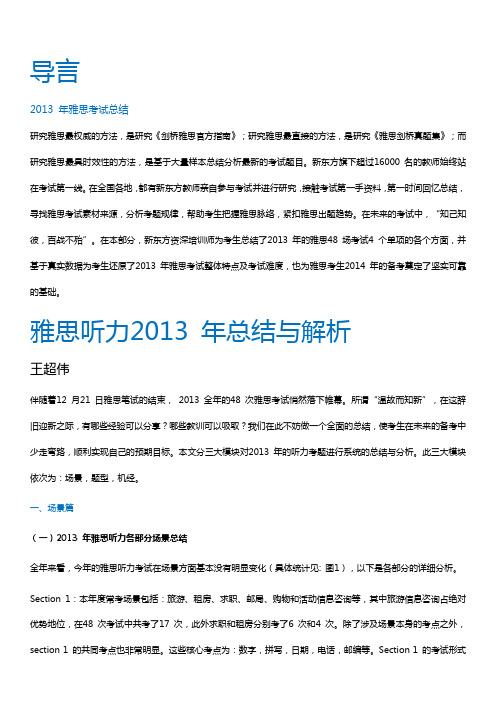
导言2013 年雅思考试总结研究雅思最权威的方法,是研究《剑桥雅思官方指南》;研究雅思最直接的方法,是研究《雅思剑桥真题集》;而研究雅思最具时效性的方法,是基于大量样本总结分析最新的考试题目。
新东方旗下超过16000 名的教师始终站在考试第一线。
在全国各地,都有新东方教师亲自参与考试并进行研究,接触考试第一手资料,第一时间回忆总结,寻找雅思考试素材来源,分析考题规律,帮助考生把握雅思脉络,紧扣雅思出题趋势。
在未来的考试中,“知己知彼,百战不殆”。
在本部分,新东方资深培训师为考生总结了2013 年的雅思48 场考试4 个单项的各个方面,并基于真实数据为考生还原了2013 年雅思考试整体特点及考试难度,也为雅思考生2014 年的备考奠定了坚实可靠的基础。
雅思听力2013 年总结与解析王超伟伴随着12 月21 日雅思笔试的结束,2013 全年的48 次雅思考试悄然落下帷幕。
所谓“温故而知新”,在这辞旧迎新之际,有哪些经验可以分享?哪些教训可以吸取?我们在此不妨做一个全面的总结,使考生在未来的备考中少走弯路,顺利实现自己的预期目标。
本文分三大模块对2013 年的听力考题进行系统的总结与分析。
此三大模块依次为:场景,题型,机经。
一、场景篇(一)2013 年雅思听力各部分场景总结全年来看,今年的雅思听力考试在场景方面基本没有明显变化(具体统计见: 图1),以下是各部分的详细分析。
Section 1:本年度常考场景包括:旅游、租房、求职、邮局、购物和活动信息咨询等,其中旅游信息咨询占绝对优势地位,在48 次考试中共考了17 次,此外求职和租房分别考了6 次和4 次。
除了涉及场景本身的考点之外,section 1 的共同考点也非常明显。
这些核心考点为:数字,拼写,日期,电话,邮编等。
Section 1 的考试形式就是把场景本身的考点和这些共同考点有机地整合在一起从而形成本部分的10 个考题。
考生只需根据这些考点设计一个对话,就可以准确的掌握本部分语言和答案特征,并结合实际练习找到自己的失分点,从而轻松在此部分拿到高分。
雅思听力原文及答案

Keys:Each question correctly answered scores 1 mark. CORRECT SPELLING IS NEEDED IN ALL ANSWERS.注:Questions 35, 38 and 40 (IN EITHER ORDER, BOTH REQUIRED FOR ONE MARK)If you score…Audio ScriptsSECTION 1LYNDA: Sara, I’ve heard that you want to move into a homestay family. Is that correct SARA: Yes, that’s right. I’ve been staying with my aunt and now my cousin is arriving from Singapore and my aunt needs the room for him.LYNDA: Oh, that’s bad luck. Well, I’II need to get some particulars first. Sara, what’s your full nameSARA: Sara Lim, and that’s Sara without the ‘h’ at the end.LYNDA: Mmm. How old are you, SaraSARA: Twenty-three, only just. It was my birthday on the twenty-first of August.LYNDA: Happy birthday for yesterday. How long have you been in AustraliaSARA: (Q1) A year in Adelaide and six months in Sydney. I prefer Sydney. I’ve got more friends here.LYNDA: What’s your address at your aunt’s houseSARA: Flat one, five three nine (Q2) Forest Road, Canterbury. And the post code is two, o, three, six.LYNDA: OK. What are you studying nowSARA: I was studying General English in Adelaide and now I’m doing (Q3) Academic English, because I’m trying to get into Medicine next year.LYNDA: That sounds good, but it’ll take you a long time. When would you like to move out from your aunt’sSARA: My cousin arrives on Friday morning, so I’d better be out on (Q4) Thursday. LYNDA: What, the seventh of SeptemberSARA: Yes, that’s right.LYNDA: That doesn’t leave us much time. Right, OK. I need to know what kind of accommodation you’d like, so I can get you something suitableSARA: Can I (Q5) share a room with someone else I’ve been alone in my room at my aunt’s and I’ve always shared with my sister and I like that.LYNDA: Yes, fine. That’ll save you money too. Would you like to live with a family or do you think that a (Q6) single person would be better for you I have lots of very nice singlepeople on my books.SARA: Do you have any women living alone, retired womenLYNDA: Yes, I have quite a few whose children have grown up and left home. In fact, I have some really lovely retired ladies, living by themselves, who just love the company of students. Most of them live in (Q7) flats, but that’s not a problem for you, is it SARA: Not at all. I’m used to that. My aunt lives in a flat too, remember. I’m not use to a big house with a garden, swimming pool, pets and all that.LYNDA: OK, fine. I know quite a bit about what you want now. I should let you know that your rent will be a hundred and sixty dollars per week. You’ll have to pay me three hundredand twenty dollars as a (Q8) deposit before you move in. The deposit is as insurance, incase you break something. You’ll need to pay (Q9) monthly to me, by cash or cheque, Idon’t mind. You don’t need to pay for gas, electricity or water, but you will need to payyour proportion of the (Q10) phone bill. Most families do that on an honour system,but you’ll have to wait and seeSARA: Mmm.LYNDA: Have you got any more questions for meSARA: When will you know where I can goLYNDA: I’II work on it now, so come and see me tomorrow and I should have some news for you then.SARA: Thanks a lot.LYNDA: Goodbye. See you tomorrow – after lunch would be better for me.SARA: OK, see you then. Bye.SECTION 2GEOFFREY: Good evening, and in this week’s edition of ‘Focus on the Arts’, Jane Hemmington is going to fill us in on what’s in store for us at this year’s Summer Festival. Over to you,Jane.JANE: Thank you, Geoffrey. This year, the Summer Festival is the biggest we’ve ever seen, so there should be something for everybody. This is the third year they’ve run it and the timing’s slightly different: for the last couple of years it’s been around the fifth to seventeenth, but this year they wanted to allow everyone enough time to recover from the first of January celebrations and they’ve put it (Q11) at the end of the month.The programme has sensational theatre, dance and also a large number of art exhibitions, but the thing the Festival is most famous for is its great street music. For today’s report though, Geoffrey, I’m looking at some of the (Q12) theatrical events that you might like to see; in particular, at this year’s theme – circuses.I’m going to tell you about two circus performances, but there are (Q13) plenty of others in the progralmme. I’ve chosen these because they represent distinct movements within circus performance. The first is the Circus Romano from Italy. As this is a travelling circus, it follows a long tradition by performing (Q14) in a marquee– which is really like a canvas portable building, usually put up in a green space or car park, rather than in a theatre or stadium.In spite of this, Circus Romano isn’t at all like the traditional circuses I grew up with. There are no animals – just very talented clowning and acrobatic routines. The show has a lot of very funny moments, especially at the beginning, but the best part is the music and (Q15) lighting. They’re magical. At forty-five dollars it’s very expensive anyway – it’s really for (Q16) adult tastes. In fact, much of it would be wasted on children – so I suggest you leave them at home.The second circus performance is Circus Electrica at the (Q17) Studio Theatre. The purists are suggesting that this isn’t a circus at all. It’s a showcase for skills in dance and magic, rather than the usual ones you expect in a circus. With only six performers it’s a small production, which suits the venue well – the Studio only seats about two hundred people. For my money it’s the aerial displays which are outstanding as well as the magical tricks – features which are missing from Circus Romano. An interesting feature of the show is that the performers are so young – the youngest is only fourteen. But it’s still well worth seeing: a good one for (Q18) the whole family.And finally, as it’s summer, you may wish to see some of the Festival performances that are being presented outdoors. Like the famous Mekong Water Puppet Troupe, performing in the (Q19) City Gardens this week. Now, water puppetry is amazing! It’s large puppets on long sticks, controlled by puppeteers standing waist deep in the lake. The puppets do comedy routines andthere is some terrific formation dancing. This is a fantastic show and the best moment comes at the end –seeing the puppeteers. When the troupe walks up out of the water, you get this amazing feeling. It’s really hard to believe that what you’ve been watching is lifeless wood and cloth. As an adult, I had a great time, but I did note that other older people in the audience weren’t quite as taken with it as I was. It’s a must for (Q20) young children though, and that’s the audience it’s really aimed at.Well, that’s all I’ve time for today, but I’II be back next week with more news of what’s worth seeing and what it’s best to miss.SECTION 3OFFICER: Hello. Er, I’m Dawn Matthews.STUDENT: Yes, hello. I’ve been referred to you because I’m enquiring about the refresher courses that you run. I’d like to find out a bit more about them.OFFICER: OK. Well, we run quite a few different short courses for students who are either (Q21)returning to study or studying part-time. Um, tell me about your situation. STUDENT: Well, I think that I really need some help in preparing for the coming semester, especially to build up my confidence a bit and help me study effectively because, yousee, I’ve been out in the work-force for nearly twelve years now, so it really is a longtime since I was last a student.OFFICER: Yes, it can seem like a long time, can’t it Um, well, let me start by telling you what courses we have that might suit you. Are you an undergraduate or postgraduate Artsor SciencesSTUDENT: Undergraduate, and I’m in the Business faculty.OFFICER: Right then. First of all, there’s our intensive ‘Study for Success’ seminar on (Q22) the first and second of February. It’s aimed at students like you who are uncertain aboutwhat to expect at college, and looks at a fairly wide range of approaches to universitylearning, to motivate you to begin your study and build on your own learningstrategies.STUDENT: Mm, that sounds good. What are some of the strategies that are presented OFFICER: Well, we try to cover all aspects of study. Some of the strategies in writing, for example, would be improving your planning for writing, organising your thinking andbuilding some techniques to help you (Q23) write more clearly. With reading,there’ll be sessions aimed at getting into the habit of (Q24) analysing material asyou read it, and tips to help you record and remember what you have read. It reallyis very important to begin reading confidently right from the beginning. STUDENT: Mm.OFFICER: There’s also advice on how to get the most from your lectures and practice in giving confident presentations, as well as how to prepare for exams.STUDENT: What about the motivational side of thingsOFFICER: Ah. Well, there’s a range of motivational exercises that we do to help the students feel (Q25) positive and enthusiastic about their study. The process of learning andexploring a subject can lead to a whole new way of looking at the world, and thestudy skills and techniques that you build up can be applied in all sorts of differentways.STUDENT: Actually, I… I’m very excited about the whole thing of taking up studying again but, you know, I’m a little nervous about whether I’ll manage to get everything done. Isuppose it’s the same for all mature studentsOFFICER: Of course it is. Two of the key components of the course are (Q26) time management and overcoming procrastination. People discover that, once they learnto plan their days, all the work can be accomplished and there’ll still be time forleisure.STUDENT: Is there an enrolment feeOFFICER: Well, er, oh, just a minute, let’s see . . . Ah, the cost is thirty pounds, which includes all course materials and morning tea. You have to arrange your own lunch. STUDENT: That wouldn’t be a problem. I already make sandwiches for my three kids and my wife and myself every day. I won’t have to change my routine.OFFICER: No. Now, I need to tell you that this is a very popular course and it’s essential that you (Q27) book well ahead of time. In fact, the Course Convenor tells me that thereare only five places left.STUDENT: What other course might be good for meOFFICER: There is one other that you could benefit from. It’s simply called ‘Learning Skills for University Study’ and is on (Q28) three consecutive mornings starting on a Monday,from nine to twelve, and costs twenty-five pounds. This is aimed at upgrading thestudy skills most school-leavers have and help them cope with the increaseddemands of university study. It focuses mainly on making students more responsiblefor their own success.STUDENT: What sort of things are covered in this courseOFFICER: Well, basically it’s more advanced thinking, note-taking, reading and writing strategies, but also some input about (Q29) stress management.STUDENT: I think I’d be better off (Q30) starting from the basics and looking at all the strategies, don’t youOFFICER: Yes, from what you’ve told me, I think that’s more in line with your situation. STUDENT: Alright then, um, can I book a place on the ‘Study for Success’ seminar course now OFFICER: Yes. Let me just get out a registration form and take down your details.SECTION 4We’re very grateful that the Committee has agreed that a representative for the Students’Union can present students’ suggestions about the design for the proposed new Union building. We appreciate that some of our ideas may not be feasible in the circumstances, but we do feel that it is important that the ultimate beneficiaries of the facilities should have some say in its design.If I could start by briefly explaining what steps were taken to find out student opinion and how we have arrived at conclusions. Firstly, a meeting was held in the current Union for our SU Committee to explain the options. Then we invited all students to submit written suggestions for the design, placing cards in a suggestion box. These suggestions then provided the basis for the design of a (Q31) questionnaire, which was completed by (Q32) approximately two thousand of the College students over a period of three weeks. Finally, the SU Committee collated the resultsand drew up a report. If I can just hand around a copy of that report. This presentation is essentially a summary and discussion of the key points of this report.So, in broad terms, the consensus was as follows. Firstly, regarding the crucial matter of the site, we presented the three options that you have proposed. One: in the city centre, near the Faculty of (Q33) Education; two: on the outskirts of the city, near the park, and three: out of town, near the (Q34) halls of residence. We asked students to cite reasons for and against these sites and, and there was remarkable agreement on all three. Site One was unpopular because of (Q35) traffic and parking problems. Site Two had a number of supporters, mainly because it was close to (Q36) most lecture rooms. And Site Three, out of town, near the halls of residence, was clearly the most popular because of access from living quarters. It was clear that the Union was mainly to be used after lectures. It was also felt that the large site would allow (Q37) more room for a choice of facilities.Our second area of interest was obviously the facilities: there was minimal interest in having a library on the premises, but one option seemed to be a reading room instead – more useful. We would like the current table games room to be replaced with (Q38) a small gym. And, if possible, a small swimming pool – not, of course, Olympic-sized! There was a large number of respondents in favour of a travel agent’s and insurance centre. We also request that there be the offices of the Student Counselling Centre, moving this from the Refectory. There was, however, much disagreement about whether to build a drama theatre. Just over forty per cent of the respondents were in favour, but a largish minority were strongly against it, claiming that it is (Q39) elitist and a waste of funds. Essentially the jury is out on that.Finally, given the number of unfortunate incidents in the current Union over the past few months, a strong point was repeatedly made about security. The recommendations would be at least (Q40) video surveillance and security personnel who would check Student Union cards on request. We doubt if it would be feasible in.Well, this is the summary of the views of the student population. As I say, fuller details are given in our report but I’m happy to take any questions if you have them . . .。
雅思听力真题题库及答案解析

雅思听力真题题库及答案解析雅思听力考试是雅思考试中最难的一部分,也是很多考生非常头疼的一项。
听力测试主要考察考生对于英语听力的理解和应对能力。
为了帮助考生更好地备考,下面介绍一些,希望对大家有所帮助。
一、题库介绍雅思听力真题题库是由各个考试机构和培训机构整理的一些真实考题。
这些题目来自于往年的考试,根据不同的主题和难度进行分类。
这些题库对考生来说非常有用,因为这些题目考察了各个不同的听力技巧和话题,帮助考生更好地了解雅思考试的形式和内容。
二、答案解析每一份题库都配有详细的答案解析,这些解析对于考生来说是很有价值的。
通过仔细阅读答案解析,考生可以了解每道题目的答题技巧和正确答案理由。
在备考过程中,应该多加利用答案解析,强化自己的听力技巧和理解能力。
在解答听力题目时,考生还可以尝试以下一些技巧:1. 使用关键词在听力过程中,考生可以尝试使用笔记本记录一些关键词。
这些关键词可以是一些数字、地点、人名等,有助于理解整个对话或讲座的内容。
通过记录关键词,考生可以更好地把握听力文本的主旨。
2. 注意听力素材中的逻辑关系很多听力题目都会考察考生对于听力素材中逻辑关系的理解。
在听力过程中,考生可以通过注意语调、重读以及连接词等来判断出逻辑关系。
这些细节有助于理解整个对话或讲座的内容。
3. 多练习模拟考试为了更好地备考听力考试,考生应该多练习模拟考试。
模拟考试可以让考生熟悉考试的形式和要求,也可以提高考生的应对能力和时间管理能力。
考生可以选择一些雅思听力真题题库中的题目进行模拟考试练习。
4. 扩大听力素材范围除了做真题题库外,考生还可以通过扩大听力素材范围来提高听力能力。
可以通过听英语广播、看英语电影或者参加英语角等方式来锻炼自己的听力技巧。
通过接触更多的听力素材,考生可以逐渐提高自己的听力理解和应对能力。
总结:雅思听力考试是一项需要大量练习和理解的考试,通过多做题库题目并结合答案解析,考生可以提高自己的听力能力和应对能力。
环球雅思测试题及答案
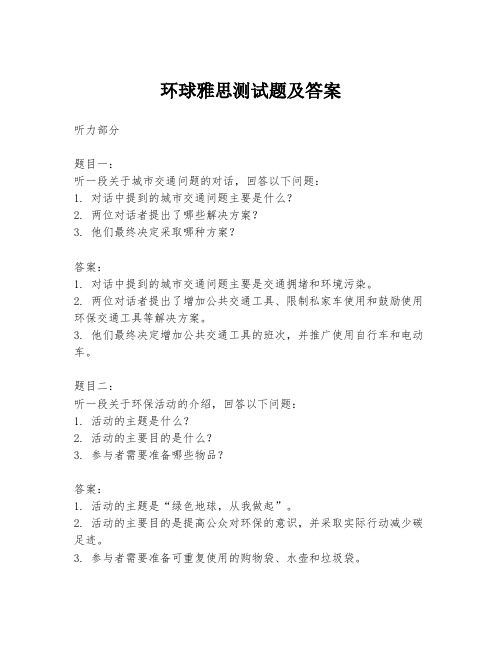
环球雅思测试题及答案听力部分题目一:听一段关于城市交通问题的对话,回答以下问题:1. 对话中提到的城市交通问题主要是什么?2. 两位对话者提出了哪些解决方案?3. 他们最终决定采取哪种方案?答案:1. 对话中提到的城市交通问题主要是交通拥堵和环境污染。
2. 两位对话者提出了增加公共交通工具、限制私家车使用和鼓励使用环保交通工具等解决方案。
3. 他们最终决定增加公共交通工具的班次,并推广使用自行车和电动车。
题目二:听一段关于环保活动的介绍,回答以下问题:1. 活动的主题是什么?2. 活动的主要目的是什么?3. 参与者需要准备哪些物品?答案:1. 活动的主题是“绿色地球,从我做起”。
2. 活动的主要目的是提高公众对环保的意识,并采取实际行动减少碳足迹。
3. 参与者需要准备可重复使用的购物袋、水壶和垃圾袋。
阅读部分题目三:阅读一篇关于全球化对教育的影响的文章,回答以下问题:1. 文章提到全球化对教育有哪些积极影响?2. 文章中提到的教育挑战是什么?3. 作者认为如何克服这些挑战?答案:1. 文章提到全球化对教育的积极影响包括资源共享、文化交流和教育方法的创新。
2. 文章中提到的教育挑战包括文化冲突、信息过载和教育不平等。
3. 作者认为通过加强国际合作、培养批判性思维和提供平等教育机会来克服这些挑战。
题目四:阅读一篇关于科技在医疗领域的应用的文章,回答以下问题:1. 文章中提到的科技在医疗领域的主要应用是什么?2. 这些科技应用对患者有哪些好处?3. 文章是否提到了这些科技应用的潜在风险?答案:1. 文章中提到的科技在医疗领域的主要应用包括远程医疗、人工智能诊断和个性化医疗。
2. 这些科技应用对患者的好处包括提高诊断准确性、减少等待时间和提供更个性化的治疗方案。
3. 文章提到了这些科技应用的潜在风险,如数据安全问题和对医疗专业人员的依赖减少。
写作部分题目五:写一篇关于“社交媒体对青少年的影响”的议论文。
2013年雅思听力真题回忆汇总

2013年雅思听力真题回忆汇总10月10日真题回忆:(一旧三新)SECTION 1:场景分析:电话预定酒店(举办party)常考场景,主要考点:人,地名拼写,电话,日期,价格,内容等。
题型:全部信息填空。
需要掌握词汇:ground floorSECTION 2:场景分析:讲一个railway之类的地点之前用来运输iron,后演变为一个tourist area之类的景点。
题型:选择+配对需要掌握词汇:engine, mine, tourist attraction, accommodation, wildlifeSECTION 3:场景分析:师生课题讨论,重点关注研究方法,内容关于classroom management on young children的项目具体规划。
(参考C6-2-3)题型:选择+配对需要掌握词汇:open question, college administration, observe, questionnaire, web researchSECTION 4:V111203场景分析:关于棉织品对于环保和时尚的影响:Cottonproduction’s effects on the environment and relative fashion trends.题型:全填空,注意定位词。
需要掌握的词汇:process the cotton, machine, suitable, irrigation system, energy, inspire, innocence, freedom, protective, maintenance, nature, salty10月12日真题回忆:(二旧二新)SECTION 1:场景分析:入学咨询题型:信息填空题需要掌握词汇:golf court, piano, Spanish, Wednesday SECTION 2: V100529场景分析:寄宿家庭及申请介绍,租房场景,考察寄宿条件,优点,申请流程,注意事项。
南通环球雅思2014.3.15雅思听力真题回忆
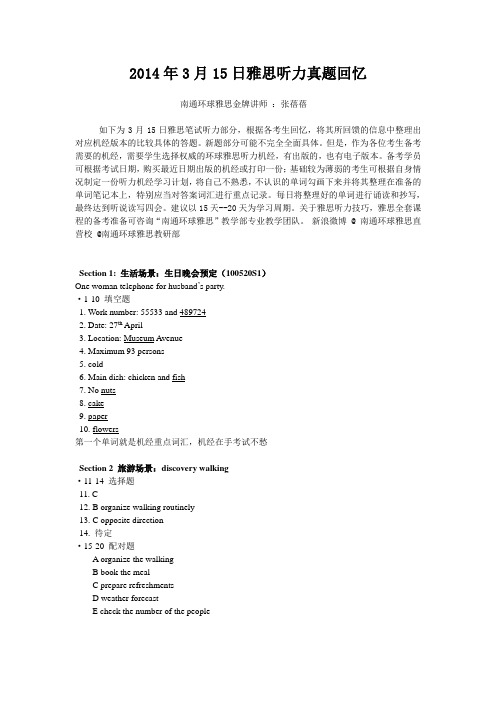
2014年3月15日雅思听力真题回忆南通环球雅思金牌讲师:张蓓蓓如下为3月15日雅思笔试听力部分,根据各考生回忆,将其所回馈的信息中整理出对应机经版本的比较具体的答题。
新题部分可能不完全全面具体。
但是,作为各位考生备考需要的机经,需要学生选择权威的环球雅思听力机经,有出版的,也有电子版本。
备考学员可根据考试日期,购买最近日期出版的机经或打印一份;基础较为薄弱的考生可根据自身情况制定一份听力机经学习计划,将自己不熟悉,不认识的单词勾画下来并将其整理在准备的单词笔记本上,特别应当对答案词汇进行重点记录。
每日将整理好的单词进行诵读和抄写,最终达到听说读写四会。
建议以15天--20天为学习周期。
关于雅思听力技巧,雅思全套课程的备考准备可咨询“南通环球雅思”教学部专业教学团队。
新浪微博 @ 南通环球雅思直营校 @南通环球雅思教研部Section 1: 生活场景:生日晚会预定(100520S1)One woman telephone for husband’s party.·1-10 填空题1. Work number: 55533 and 4897242. Date: 27th April3. Location: Museum Avenue4. Maximum 93 persons5. cold6. Main dish: chicken and fish7. No nuts8. cake9. paper10. flowers第一个单词就是机经重点词汇,机经在手考试不愁Section 2 旅游场景:discovery walking·11-14 选择题11. C12. B organize walking routinely13. C opposite direction14. 待定·15-20 配对题A organize the walkingB book the mealC prepare refreshmentsD weather forecastE check the number of the peopleSection 3 学术场景:男女选专业和学校(V66)·21-23 选择题21. Why did Lucy choose journalism? C22. How many students can find their jobs on completion of course? BA 66%B 88%C 98%23. Why did Lucy choose her university? CA the theoretical backgroundB TV facilitiesC work placement·24-30 填空题24-25 Why did Jack choose science24 easy to understand and it is 25 challenging26-27 the girl’s school: though it is not inside downtown, but social life is good: because 26 a cinema and 27 lots of clubs28 lots of activities29 1 year30 move to apartmentSection 4 学术讲座:vertical farmingVertical farming和traditional farming 对比·31-40 填空题irrigationoilfoodtemperaturehabitat losssoilpopulationfloodswindhumidity此次考试较难:habitat和humidity拼写容易出错。
雅思18test3part2听力解析
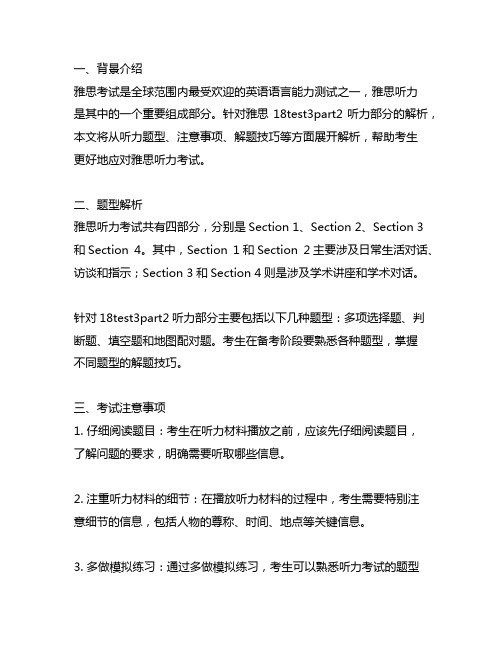
一、背景介绍雅思考试是全球范围内最受欢迎的英语语言能力测试之一,雅思听力是其中的一个重要组成部分。
针对雅思18test3part2听力部分的解析,本文将从听力题型、注意事项、解题技巧等方面展开解析,帮助考生更好地应对雅思听力考试。
二、题型解析雅思听力考试共有四部分,分别是Section 1、Section 2、Section 3和Section 4。
其中,Section 1和Section 2主要涉及日常生活对话、访谈和指示;Section 3和Section 4则是涉及学术讲座和学术对话。
针对18test3part2听力部分主要包括以下几种题型:多项选择题、判断题、填空题和地图配对题。
考生在备考阶段要熟悉各种题型,掌握不同题型的解题技巧。
三、考试注意事项1. 仔细阅读题目:考生在听力材料播放之前,应该先仔细阅读题目,了解问题的要求,明确需要听取哪些信息。
2. 注重听力材料的细节:在播放听力材料的过程中,考生需要特别注意细节的信息,包括人物的尊称、时间、地点等关键信息。
3. 多做模拟练习:通过多做模拟练习,考生可以熟悉听力考试的题型和节奏,提高对听力材料的理解和把握能力。
4. 提高听力速度:在备考过程中,考生要提高自己的听力速度,尽可能准确地捕捉到材料中的重要信息。
四、解题技巧1. 注意关键词:在听力材料中,有些信息是直接呈现的,而有些信息需要通过关键词来获取。
考生要注意听力材料中的关键词,以便更好地理解材料内容。
2. 注意上下文逻辑关系:在做题的过程中,考生要注意上下文的逻辑关系,通过理解对话或讲座的整体逻辑来帮助解答问题。
3. 注意同义替换:有些题目会采用同义替换的方式进行表述,考生在做题时要留意同义词的使用,以免错过重要信息。
4. 预测答案:在听力材料播放的过程中,考生可以根据已经了解的内容预测答案,这样可以帮助更好地把握重点信息。
五、总结雅思18test3part2听力部分的解析需要考生在备考阶段充分了解题型特点,注意事项和解题技巧,通过反复练习提高听力水平。
雅思真题听力原文及答案解析
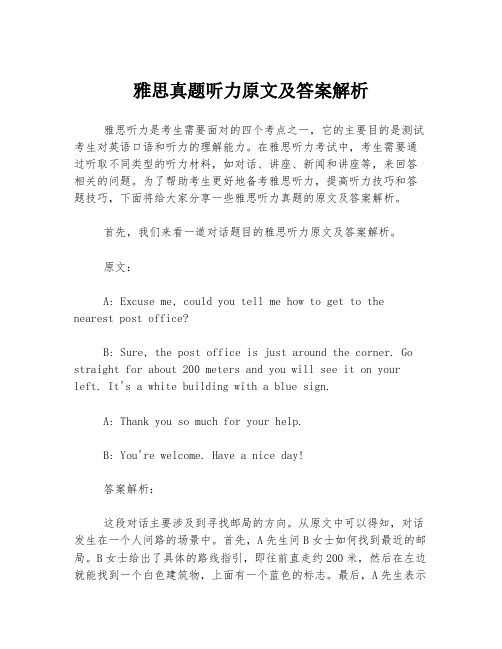
雅思真题听力原文及答案解析雅思听力是考生需要面对的四个考点之一,它的主要目的是测试考生对英语口语和听力的理解能力。
在雅思听力考试中,考生需要通过听取不同类型的听力材料,如对话、讲座、新闻和讲座等,来回答相关的问题。
为了帮助考生更好地备考雅思听力,提高听力技巧和答题技巧,下面将给大家分享一些雅思听力真题的原文及答案解析。
首先,我们来看一道对话题目的雅思听力原文及答案解析。
原文:A: Excuse me, could you tell me how to get to the nearest post office?B: Sure, the post office is just around the corner. Go straight for about 200 meters and you will see it on your left. It's a white building with a blue sign.A: Thank you so much for your help.B: You're welcome. Have a nice day!答案解析:这段对话主要涉及到寻找邮局的方向。
从原文中可以得知,对话发生在一个人问路的场景中。
首先,A先生问B女士如何找到最近的邮局。
B女士给出了具体的路线指引,即往前直走约200米,然后在左边就能找到一个白色建筑物,上面有一个蓝色的标志。
最后,A先生表示感谢,并和B女士道别。
从这个对话中,考生可以了解到在雅思听力中,常常会出现关于问路、指路的题目。
听力材料中会提供一些具体的方向指示词,如straight(直走)、around the corner(拐角处)等。
考生在备考雅思听力时,应该熟悉这些常用的方向指示词,并学会根据这些指示词来判断和选择正确的答案。
接下来,我们看一段关于讲座的雅思听力原文及答案解析。
原文:Lecturer: Good morning, everyone. Today, we are going to talk about the history of art. Art is a form of human expression that dates back to ancient times. It can be foundin cave paintings, ancient sculptures, and intricate designson pottery. Throughout history, different civilizations have developed their own unique forms of art, reflecting theculture and beliefs of the time. In this lecture, we will explore the major art movements, such as the Renaissance, Impressionism, and Cubism, and discuss how they haveinfluenced the development of art over the years.答案解析:这段讲座主要介绍了艺术的历史和不同艺术运动对艺术发展的影响。
